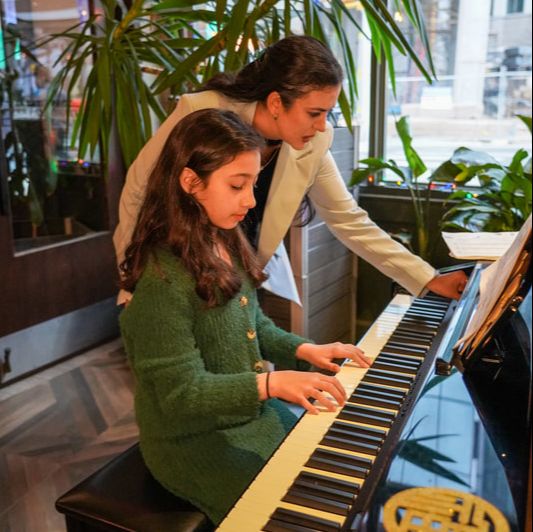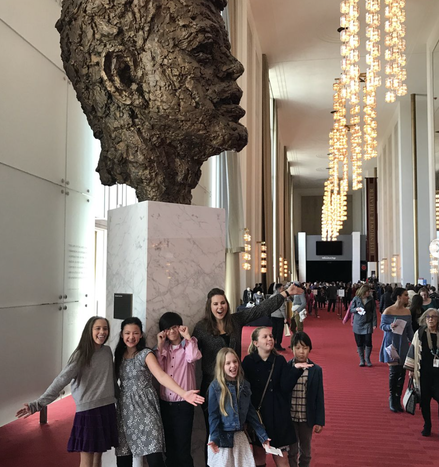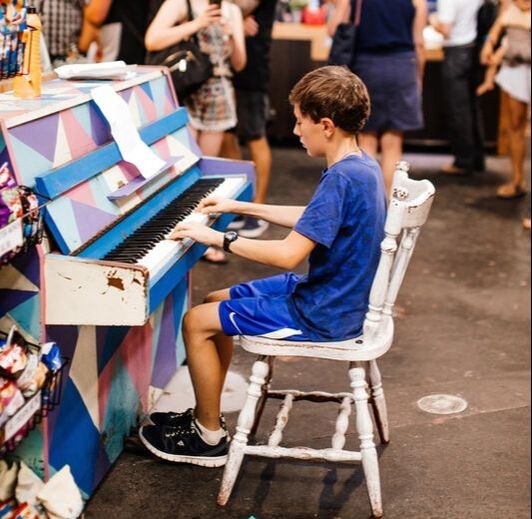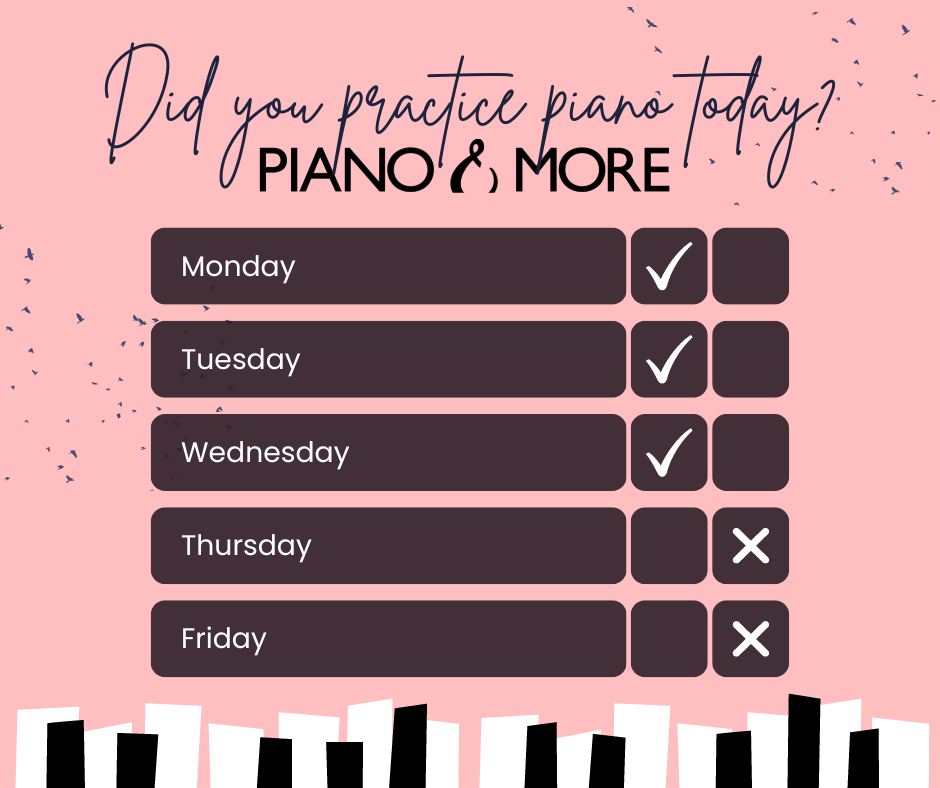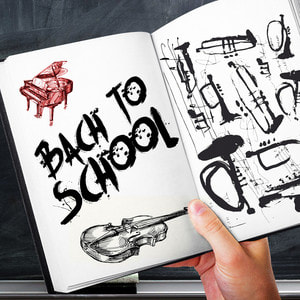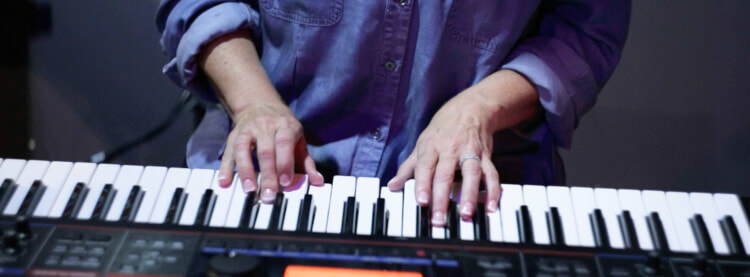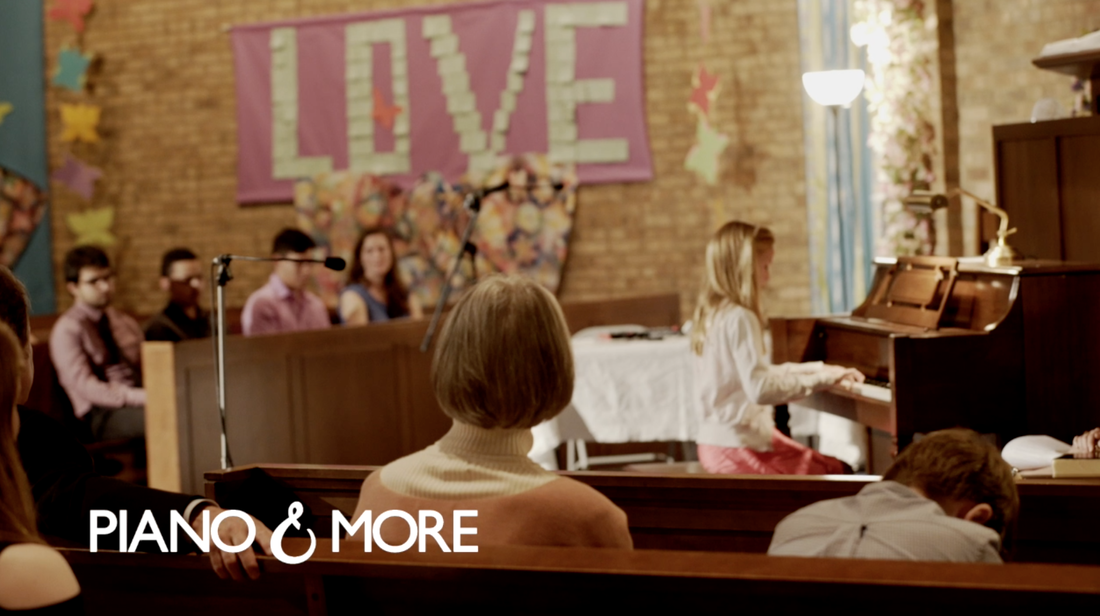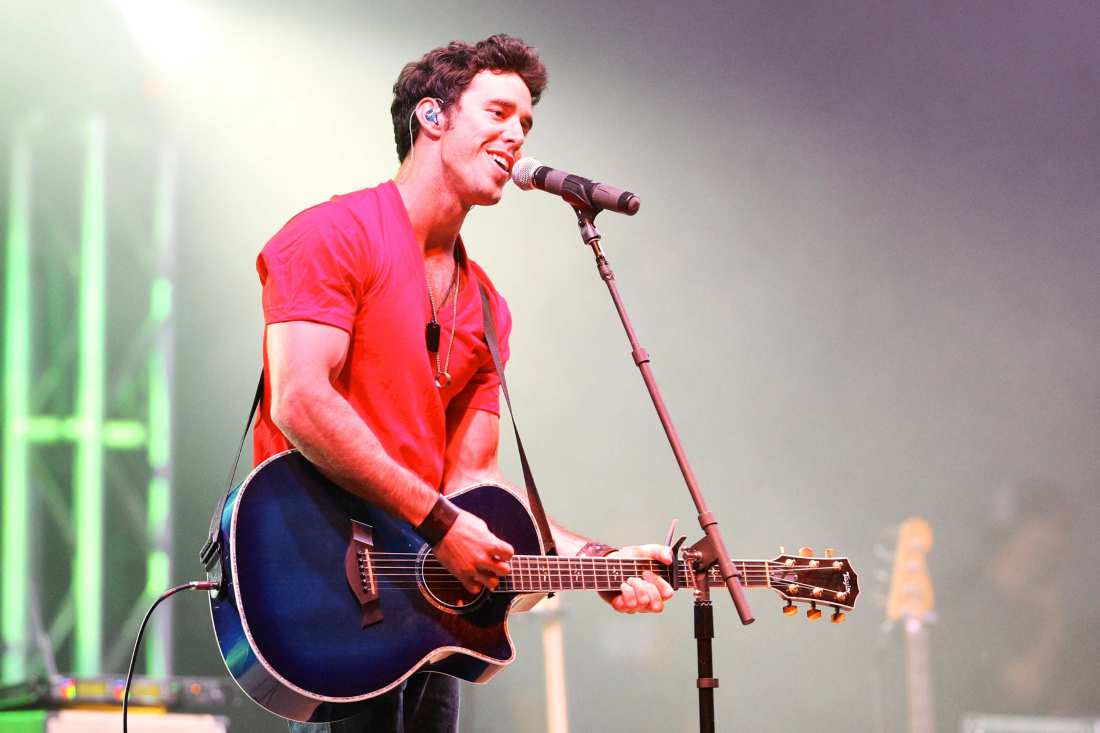|
Last month, TNR Cafe in Arlington transformed into a lively stage for our young musicians, hosting an unforgettable Open Mic event. Ten talented performers performed for the restaurant’s dinner customers, each showcasing their unique musical flair. Amidst the clinking of dishes and soft conversations, the air was charged with excitement and pride with each student who got to experience performing in a public but casual venue style environment.
First, we extend our heartfelt thanks to Teacher Sheida for hosting the event and making sure each student felt confident and comfortable. By implementing a low stress performance experience, teachers like her empower students to step into the spotlight again and again! Next, we’d like to thank TNR Cafe, for collaborating with us and providing the perfect setting along with serving delicious Chinese food. They made us feel very welcome and we hope to host again! And last, thank you to the estimated 35 family and friends who filled the venue to support our performers! Your support and enthusiasm fuel our commitment to nurturing the next generation of musicians.
0 Comments
Piano & More is thrilled to host our upcoming field trip to the Kennedy Center this month, celebrating Duke Ellington with the National Symphony Orchestra. Duke Ellington, a jazz pioneer, reshaped music with his innovative compositions, blending jazz, classical, and popular music seamlessly. His influence transcended genres, shaping the landscape of American music. The reputable Kennedy Center located in Washington DC provides the perfect venue, amplifying the significance of the event.
Ellington's legacy extends beyond his musical contributions as he was a trailblazer for racial equality in the music industry, championing diversity and inclusion. Through his music, he challenged societal norms, leaving an indelible mark on history. Led by Teacher Abby, this student field trip is now fully booked! Our students will witness Ellington's genius firsthand, experiencing a concert specifically designed for young audiences and performed by the prestigious National Symphony Orchestra. As we pay tribute to Duke Ellington, we're not just attending a concert; we're honoring a visionary artist whose impact transcends time. We can't wait to write more about it in our next blog & newsletter. For more event details, visit the Kennedy Center website:https://www.kennedy-center.org/nso/home/2023-2024/duke-ellington/ Hey there, music enthusiasts and proud parents! Grab your sheet music and appetites because something exciting is about to go down at TNR Cafe. Picture this: real piano tunes, kids showcasing their musical flair, and plates piled high with scrumptious goodness – it's Open Mic Night! Why is this so important, you ask? Well, for starters, performing in a relaxed environment with the most supportive audience is the ultimate confidence booster for a musician. We're talking about our mini-musicians strutting to a piano, conquering stage fright like it's their arch-nemesis. Watch your kids transform into musical rock stars right before your eyes. And let's not forget the inspiration that can ignite! Your kids will be inspired when they see other kids their age perform. It may even spark some interest in a new genre or song, hence setting a new dream/goal. Could it inspire more practice? We've seen it happen before! But it's not just about the music – it's a crash course in people skills too. Navigating the audience, interacting with applause, and basking in shared moments of musical magic – these kids are not just playing notes but building connections. Who knew performance could be a crash course in social dynamics? Move over, social studies! Now, a big shoutout to TNR Cafe – our host with the most! Thank you for turning your spot into a haven for our little maestros. A real piano, some mouthwatering dinner options, and a cozy atmosphere – you're turning this night into a musical feast for both ears and taste buds. We can't wait to dig into the delicious food, tap our feet to the beat, and create some fantastic memories together. Cheers to a night of delightful melodies, yummy food, and community vibes! Written by Nicole Surovcek Continuation (Part 2 of 2)
Tracking progress. How many of you like to check your “steps for the day” on your apple watch? How great do you feel when you see charts reflect your work and results? We want to know if what we are doing is actually working. Keeping track of progress on paper or an app can be very rewarding. Talk to your music teacher about their recommended ways to keep track of practice & progress. There’s so many resources out there now! Looking forward to goals and events. Students are more likely to practice when they know they have a set of goals to achieve. Goals range from being able to play a favorite song to performing a song at a recital or Open Mic! In addition, parents sharing their children's goals with friends and family can also help motivate students to practice regularly. For example, if there is a concert or recital coming up soon, sharing this information with friends and family could help create excitement within the student (and maybe even their parents too). When you share your students' progress and achievements, it will encourage them to keep practicing. Practicing music requires many different kinds of support. The biggest part of practicing music is the student's motivation. They need to feel like they are making progress in their playing, or they will become frustrated and give up on the instrument. Parents can be great sources of encouragement for their children when it comes to learning an instrument. They should encourage their child every time he/she practices well or successfully completes a piece that he/she had been struggling with beforehand. Another great source of motivation can come from other musicians. Encourage your student to connect with other musicians and students, either online or in person. This helps them understand how to use their skills and see how much bigger music is, when you put several instruments together. It can be very exhilarating! Conclusion If you want to keep your students motivated to practice, it's important to remember that they need more than just the right music and a good teacher. They also need encouragement and support from their parents, friends, and teachers. So if you're struggling with motivation in your own life or with your kids', try implementing the above tips, week by week! Written by Nicole Surovcek Introduction For many young students, practicing piano may be the most challenging part of their musical journey. It's hard to practice when you're tired from school or distracted with other activities. Fortunately, there are ways parents can motivate students to practice piano—and they don't require any special skills or tricks! First, the practice routine. As cliche as it sounds, a reliable routine proves to be one of the best ways to build good habits. If students have a set time that they know when and where they'll be able to practice, then it's easier for them to commit. The best way to make this system work is by creating an environment where practicing piano feels like something that happens naturally rather than something forced through sheer willpower alone. The best way to do this is by setting up a routine where practice is set at specific times every day. Some examples are right before school or right after eating dinner. Next, the practice environment. Learning music theory and reading notes on a staff requires a lot of concentration. Students are learning a new musical language as well as developing new hand eye coordination. Neuron connections are being built! In order to do that, the practice environment needs to be able to facilitate that kind of concentration. First, we want to check that distractions are removed from the room. For example, it wouldn’t be a good idea to have a sibling playing video games in the background. Second, is the room quiet or have a comfortable level of noise? And last is organization! Is the sheet music and/or lesson book easy to locate and use? A messy piano with sheet music scattered about will only add to the list of to-dos, which could discourage the student from jumping into a quick practice session. Show enthusiasm. Parents can motivate their children by showing their own enthusiasm for their child's progress. When a student is playing something, be sure to compliment them on their playing. Make them feel good about what they are doing! This is important when working with younger children who are developing good habits as it helps them attach a positive feeling to a task. Similarly, if you notice your child is struggling with a particular part in the music, do not make it seem like this is a bad thing. Instead, show interest in what they are trying to learn and ask questions about the challenging part being played. Talking about the difficulties will help the student work through it and eventually, build confidence in their music abilities. Like this list so far? Stay tuned for next Monday, for part two! Written by Nicole Surovcek It's been a rush of a summer with families finally being able to travel more freely! Those back-to-school ads feel too early...and yet here we are, only a couple weeks away from the start of the new school year. Here's our list of Bach-To-School items we recommend for our music students.
Music Starter Kit:
Piano (tuned) OR Keyboard/Digital Piano with pedal, piano bench and stand First preference- 88 keys, fully weighted keys Second preference- 88 keys, semi-weighted keys Guitar: depends on type/genre/and size. Ask instructor for recommendation 2. Music Books: recommended by teacher 3. Homework notebook (a simple notebook will work) 4. Pen/pencil 5. Good lighting or Piano Lamp Organization Supplies: over time, students will purchase loose sheet music and workbook print outs so we recommend the following supplies to stay organized
Fun Piano Accessories
Jazz guitar has evolved a lot over the years, beginning as mainly a rhythm instrument meant to accompany singers and lead instruments, to having more of a lead role, and to eventually becoming the leading instrument in many jazz groups. Here are some great Jazz guitarists that have made a big impact in jazz: Charlie Christian was one of the earliest adopters of the electric guitar and also one of the first jazz guitarists. He helped move the guitar from being a mostly rhythm instrument in jazz to having more of a lead role. His solos were innovative and played a vital role in developing the bebop guitar language. He influenced the future generations of jazz guitarists to come. Here he is with the Benny Goodman Orchestra: https://youtu.be/Q8oGSOB012g Wes Montgomery started playing guitar in his 20s after hearing a record of Charlie Christian playing. His signature sound and warm tone consisted of using his thumb instead of a pick and soloing using octaves and chords. He also was amazing at his chord melody playing (playing the chords and melody of the song together). Here he is using his famous octave playing on the song Polkadots and Moonbeams: https://youtu.be/gMuWWfKUQ6c George Benson is a guitarist and singer who has played in various genres including jazz, funk, and R&B. He evolved from starting out as a straight ahead jazz guitarist to a singer, guitarist, and songwriter with a decades long career enveloping many genres. He is also a winner of multiple Grammys and he still tours to this day. The question is, “Is he a guitarist who sings, or a singer who plays guitar?” Here he is playing on the jazz standard Billie’s Bounce: https://youtu.be/7dMMR9uuKzA Written by Gustavo Correa Ever hit a rough patch with practicing? In those times, you may wonder, “Will all this effort pay off? Will I (or my child) even continue playing piano throughout adulthood? What’s the point?” Maybe the most important benefits are not musical. What if there are character traits being cultivated that don’t fully blossom till later in life? As an adult, I’ve grown in my appreciation of being a pianist more than ever before- especially when it comes to the skill of reading music. I can find 6 correlations in which piano has benefited my life as an adult. Piano is: 1. Meditative In order to follow notes on a page, one is forced to focus. Sound is abrupt, therefore you immediately feel a change in your current state. The very nature of listening to piano keys is calming and contemplative. One can feel the body relax and the mind clear. Worries from that day are forgotten. All that matters in this moment, is this flow of energy that wraps around you. When I play classical music in particular, I am transported into an even deeper meditative state. I observe how my emotions rise and fall with the music. These specifically arranged harmonies, clashes, and musical phrases push me into the world of a composer some hundred to several hundred years ago. There’s so much culture, history, and emotion that I am now witnessing via their ears and experiences. It’s quite an exhilarating feeling. I’ve become increasingly interested in how classical music is designed because of this meditative factor. 2. Therapeutic Laughing, crying, socializing…there’s many ways of releasing expression and playing an instrument is also one of them! This is especially beneficial to personalities who are not naturally expressive with words. When it’s hard to understand your feelings, music comes in for the rescue. Being vulnerable with an instrument can feel safer than with a real person. Songs are also more forgiving and comforting to your emotions, than say, a boxing bag. On conflicting days, experiment with playing your own melodies. If you find your emotions being absorbed by the keys themselves, you’ve found another way to communicate or release. Who knew that a good practice could make one feel stronger and anew. 3. Delayed Gratification How many people do you know who are comfortable with delayed gratification? I find them few and far between, after all, now-days there’s simply no need. You want a specific meal? You got UberEats to pick it up for you. You want another blanket? Amazon will bring it to you tomorrow. You don’t like the movie you’re watching? Within seconds, Netflix has plenty more options. You want another associate to help you on a project? Post a job and you’ve got lots of applicants. It doesn’t take much effort to get results. Learning any instrument, will teach you otherwise. That mentality of “little effort, immediate reward” needs to be tossed out the window. Even talented musicians are only as good as they practice. It takes months, sometimes years, to get just one piece down. You might feel you are “not quite there yet” forever and you have to be okay with that. You practice the same measure 30 times, morning and evening, and MAYBE you’ll be happier with it tomorrow. As I’ve grown older, I have noticed there’s something quite admirable about someone who can work hard, stay focused, and commit to a challenge without knowing when and if the reward will come. It may be these people will stand out in a growing competitive world. 4. Discipline Part of learning an instrument means you have to practice it daily. Practicing 4 hours on the weekend won’t get you there as fast if you had split up that time into 30 minutes everyday. The key is to practice on a daily basis- and that’s a kind of discipline that will take you far. Remember any new skill requires more effort in the beginning than later. If you are constantly stuck in the take-off, you’ll constantly feel how hard it is, never seeing the benefits. Once you do see the benefits, you won’t mind being disciplined as much. Imagine how much more ahead you are once you’ve already gone through this cycle. These experiences give you real world knowledge and will give you a realistic perspective when choosing to engage in a new discipline. 5. Dismantling Fear Eleven pages of sheet music laid out in front of you will feel overwhelming. Organizational skills are crucial here. How can I make this realistic? Where are the patterns in this piece? How can I break it down and still accurately piece it back together without losing myself? A music teacher takes that responsibility upon themselves and shows a student different techniques in breaking a piece down. Suddenly, a student realizes, “Actually yes, I can do this.” When you experience this again and again, song after song, you start to believe that anything (even the overwhelming projects) can be done. As long as you have the skills to organize the challenge into smaller manageable parts- of course it can be done. As an adult, being faced with new challenges, I face it with a sort of confidence because I’ve already had some training in knowing how to be my own navigator. 6. Identifying Patterns Being able to find patterns in one’s life can save years of lost effort. A good music teacher will train you to look for patterns in the sheet music before you play your piece. Yes, it’s great if you can read notes accurately on the whim, but it’s better (and more efficient) when you can spot patterns in the piece even before you play. What’s even better than that, is mixing the two! Can you identify patterns in real time? These are all things we work on as we read music. Imagine if we applied this to real life situations. Do you know the patterns in your daily life? How do we respond under pressure? What do we turn to when we want to check out? How does your partner behave when they are holding back? What kind of friends is your child drawn to? Think about how much faster you get to know yourself, your loved ones once you’ve been conditioned to pick up patterns. Those are the six benefits that have been my favorite in my adult life. Of course, the benefits of learning an instrument are vast- increased focus, creativity, multi tasking, coordination are just a few more. If you’d like to know more, you can refer to this blog that already has study links attached. The recital day had arrived. It’s a mix of emotions- excitement and anxiety. A few minutes before the recital began, a mother came up to me saying, “Sam is refusing to play. He’s too nervous.” I immediately thought back to how hard he had worked to learn this song. He was playing it just fine a week ago. What can I do to calm his nerves? I tried talking with him, but it was evident that his emotions were too high. I ended up skipping over his name in the program during the recital.
How can one perform well with such elevated levels of emotion? When we practice piano pieces at home, there are no hormones disrupting your physiological state. It starts while you’re waiting for your name to be called. Hands get sweaty, heart beating, legs trembling, and suddenly…I can’t feel my fingers. How can I finish my song when I can’t control my body? Can I train myself to suppress a stress response? Or do I have to learn to deliver an excellent performance with pressure? Meeting high expectation in front of an audience can cause a nervous reaction that inhibits fine motor functioning. When you’re overwhelmed, it’s hard to do one thing correctly, let alone three or four things at once. Thoughts such as “I have to play it perfectly” “I can’t make too many mistakes” “If I mess up, then they won’t think I’m good” and “I only want them to see how well I can play”, resembles an individual that is struggling with performance anxiety due to high expectations. I decided to interview a few students that seemed to have no nerves on recital day. They performed their piece to the point of perfection. What’s their secret? Well, I asked and here’s their response (keep in mind they are 13 years old and under): “Practice in front of other people- 5 or more. Do it a couple times until you are comfortable” “If you mess up, just continue, because it doesn’t matter. People don’t always know” “Just keep going, don’t worry about the mistakes” “Imagine that no one is there. Like I’m in my room practicing, I don’t think of the people watching me.” “Pretend everyone’s just wearing their underwear” As you can see from those responses, it’s a style of thinking that will determine your success. To be able to perform well, one will need to prepare their mind for the big day. Here are some tips to that will promote confidence and help minimize the pressure of a performance: 1) Muscle memory beats anxiety A performance piece demands hours of practice and repetition. After a while your fingers play on their own and there’s no need for the brain to concentrate on reading music. You become very proud in this moment, because you don’t feel like you are “working” anymore. The song has molded as a part of your body. Muscle memory saves a many performances. 2) Practice in front of an audience Sometimes it just takes 1 person to start the nervous reaction. Invite your family, friends, or neighbors to come watch you play. Another tactic I use with my students, is filming them. It can help set the stage for the big day and the more you practice performing in a stressful setting, the less intimidating it will get. 3) Have a Plan B When you can’t regain feeling in your fingers or if you can’t get past a difficult part, know how to finish the song on a good note. There’s usually a part of the song that you know very well and are confident in, so practice easing into that part and tying it into the song finale. 4) Accept the worst First, ask yourself, what’s the worst that could happen? Whatever that is, you will free yourself if you can accept it. If the worst is not being able to complete the song, or making multiple mistakes, and it happens during your performance, the best thing you could do for yourself, is be okay with it. You might be surprised at how much energy you’ll find in that moment. Know that it is better to try and gain some type of experience versus gaining none. Sam wasn’t mentally prepared, but I believe if he had been willing to work on these four steps, he could perform his song well. You can. You can absolutely have a student master musical techniques, note-reading, rhythm, and ear training. It’s just like teaching someone how to multiply numbers or drive a car. Eventually, the skill can be learned. But of course, there are always those that are better than others. What makes a musician stand out? Here are my thoughts.
First, mastering a skill takes hours of work. When people discover my occupation, they usually exclaim, “Oh I’ve always wanted to learn piano! Can you teach me?” But do you know what you’re asking for? Are you willing to commit at least several hours a week to piano? Yes, I expect that you will review homework at least 20-30 minutes a day, which adds up to about 3-4 hours of your time throughout the week. To be able to do that, you need to depend on a motivation powerful enough to bring you back day after day. It could be outsourced, or it could come from within. A parent demanding their child to practice 30 minutes before they are able to watch their favorite show for example, is motivation coming from the outside. Recital performances, sibling rivalry, and meeting teacher expectations are other outsourced examples. If music is always “work” for you, then your motivation is most likely outsourced- that kind of musician can only go so far. But my golden students are the ones who are motivated from within. Those are the students I can rely on and know, they will be musicians for life. That inward motivation can come from different sources. It could be a desire to understand music, a new challenge, or a curiosity to know another dimension. For me, it was the discovery of being able to communicate my emotions. It’s a form of therapy if you will. It’s a moment of release, as I like to call it. Being able to express and release emotion through music brings joy to my soul. So what makes a natural musician? It’s a desire fueled by an inward motivation that will always call them back. It’s that inward motivation that makes you stand out from among the rest. |
Author(s)P&M Teachers: Archives
March 2024
|
QuickLinksLessons in Falls Church |
LEssons in ArlingtonPiano Lessons in Arlington
Guitar Lessons in Arlington Voice Lessons in Arlington Drum Lessons in Arlington LESSONS IN MCLEAN |
|
Registered 501c3 organization EIN 38-4077902 © COPYRIGHT 2023. ALL RIGHTS RESERVED.

